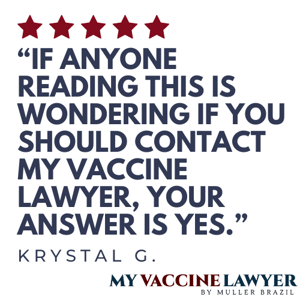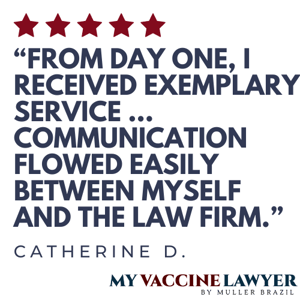Shoulder Tendonitis
Vaccine Injury
Shoulder tendonitis, also referred to as Rotator Cuff Tendinopathy,
is marked by pain and impeded motion in the shoulder area.
Instances where a vaccine injection is improperly administered into or around the rotator cuff area rather than
the intended deltoid muscle can lead to inflammation and aggravate shoulder tendonitis.
Injured by a vaccine?
Over 80% of vaccine injuries are from flu shots.
Our lawyers have represented thousands of clients across the United States.
What is Shoulder Tendonitis?
Shoulder tendonitis is a medical condition characterized by inflammation and irritation of the tendons surrounding the shoulder joint.
This inflammation results in pain and discomfort, often impairing the ability to move the shoulder freely. While tendonitis in the shoulder can arise from various causes like sports injuries or age-related wear and tear, an increasing focus is being placed on its occurrence as a potential vaccine injury.
In cases of vaccine-related shoulder tendonitis, the condition may develop following the administration of a vaccine. This typically happens when the vaccine is incorrectly injected into the tendons or bursa around the shoulder joint instead of the intended deltoid muscle. Such errors in injection technique can provoke an immune response, leading to inflammation in the shoulder tendons, marking the onset of tendonitis. Shoulder tendonitis is one of several injuries that fall under the broader scope of Shoulder Injury Related to Vaccine Administration (SIRVA).
Symptoms of Shoulder Tendonitis
The onset of shoulder tendonitis can be shown through various symptoms, with shoulder pain being the most prominent and telling sign
This pain typically concentrates around the shoulder joint, often intensifying during arm movement or at night, potentially disrupting sleep. In vaccine-related cases, the shoulder pain can be acute, from a few hours to days post-vaccination. This pain is often felt in the left shoulder, given that vaccines are commonly administered in the left arm for right-handed individuals.
Other key symptoms include:
- Chronic shoulder injury: A persistent ache or discomfort in the shoulder that doesn't subside with typical rest and may worsen over time.
- Left shoulder pain: Especially following a vaccine, this can indicate an improperly administered shot.
- Atypical shoulder pain: Pain that doesn't follow the usual patterns of common shoulder injuries, potentially indicating an unusual reaction to a vaccine.
It's crucial to note that the symptoms of one shoulder injury can closely mimic those of another. Therefore, accurately identifying the specific type of shoulder injury – tendonitis, bursitis, or vaccine-related injury – is essential for effective medical treatment and legal considerations. This distinction is vital for individuals considering legal action for a vaccine-related injury.
Causes of Shoulder Tendonitis
Shoulder tendonitis arises from various causes. Overuse and repetitive shoulder movements often lead to this condition. Activities like:
- sports
- heavy lifting
- repetitive work tasks
These can strain the shoulder tendons. Aging is another factor, as tendons lose elasticity over time. However, a notable cause to consider is vaccine administration. Particularly, improper deltoid intramuscular injection can lead to shoulder tendonitis. This usually occurs when a vaccine is injected too high in the arm. It affects the sensitive tissues within the shoulder area. According to a study, such injury related to vaccine administration, known as SIRVA, accounts for over 70% of vaccine injury compensation claims. Vaccines are typically safe. However, incorrect administration techniques can lead to complications like shoulder tendonitis. Healthcare providers must follow proper injection protocols. This reduces the risk of SIRVA and related injuries.

Diagnosis of Shoulder Tendonitis
Diagnosing shoulder tendonitis typically starts with a physical examination. Healthcare professionals assess pain points, range of motion, and strength in the shoulder. They inquire about recent activities or specific incidents, like a vaccine injection, that might have triggered the pain. In vaccine-related cases, the timing of symptoms post-vaccination is crucial. It helps in linking the condition to the vaccine. If the physical exam is inconclusive, further tests may be needed. Magnetic resonance imaging (MRI) is often used. This imaging test helps in viewing the tendons and surrounding tissues in detail.
Healthcare professionals may also use ultrasound. It is a less invasive method to check for inflammation and damage in the shoulder. In some cases, blood tests are conducted. They rule out other conditions that might mimic tendonitis symptoms. The right diagnosis is crucial for effective treatment. It guarantees a personalized approach to recovery, whether the cause is general wear and tear or vaccine-related.
Prognosis of Shoulder Tendonitis
The prognosis for shoulder tendonitis largely depends on the severity of the condition and how quickly treatment is initiated. Here's what patients can generally expect:
- Recovery Time:
- Mild to moderate cases: Recovery typically spans 2 to 6 months.
- Severe cases: Healing might take up to a year, especially if a chronic shoulder injury occurs.
- Effectiveness of Timely Treatment:
- Early intervention is key.
- Timely treatment significantly improves the prognosis.
- Delayed treatment can lead to a limited range of motion and prolonged discomfort.
- Long-Term Effects:
- Most patients regain full or near-full shoulder function.
- Chronic issues may develop without proper care, causing persistent pain and stiffness.
- Regular physical therapy and exercises help maintain shoulder health.
- Impact of Vaccine-Related Tendonitis:
- The prognosis is generally good with an appropriate medical response.
- Recovery may be longer if nerve damage occurs during vaccine administration.
If you've received an unfavorable prognosis for a vaccine-related injury, seeking assurance and hope is natural. We invite you to explore our clients' stories who have been in similar situations. Their experiences with our dedicated legal and medical support have led to successful outcomes, even in the face of daunting prognoses.
Treatment of Shoulder Tendonitis
Effective treatment for shoulder tendonitis involves a combination of medical and physical therapies. Here's an outline of the commonly recommended treatments:
- Physical Therapy:
- Central to recovery, it helps restore strength and flexibility.
- Exercises and stretches are tailored to reduce pain and improve function.
- Corticosteroid Injections:
- Used for reducing inflammation and pain.
- Effective in providing temporary relief, especially in acute cases.
- Nonsteroidal Anti-Inflammatory Drugs (NSAIDs):
- Commonly prescribed to manage pain and reduce inflammation.
- Includes over-the-counter options like ibuprofen or naproxen.
- Conservative Treatment:
- Rest and ice packs to minimize swelling and relieve pain.
- Avoiding activities that aggravate the condition is advised.
- Additional Therapies:
- Heat therapy and ultrasound treatment might be used.
- In some cases, surgery may be necessary for severe tendon damage.
Patients need to follow the treatment plan recommended by their healthcare provider. Individual responses to treatment can vary, and adjustments may be necessary for optimal recovery.
Complications of Shoulder Tendonitis
While most cases of shoulder tendonitis respond well to treatment, certain complications can arise, particularly in vaccine-related injuries. Understanding these complications is crucial for timely intervention and legal considerations.
- Axillary Nerve Injury:
- Occurs when the nerve is compressed or damaged.
- Can lead to numbness or weakness in the shoulder and arm.
- Frozen Shoulder (Adhesive Capsulitis):
- Characterized by stiffness and restricted motion in the shoulder.
- May develop if shoulder tendonitis is not treated effectively.
- Surgical Intervention:
- In severe cases, surgery may be required to repair damaged tendons.
- Surgical risks include infection, nerve damage, and prolonged recovery.
- Adverse Reactions:
- Rare but serious reactions may occur, especially in vaccine-related cases.
- Symptoms like intense pain or loss of function post-vaccination need immediate attention.
If you experience complications following a vaccine leading to shoulder tendonitis, seeking medical and legal advice is important. Vaccine-related injuries, although rare, can have lasting impacts on your health and livelihood.
Our experienced legal team is ready to help you deal with the complexities of vaccine injury claims. We will help you understand your rights and options for seeking compensation.
Contact us for a consultation to discuss your case and learn how we can assist you in achieving the justice and compensation you deserve for your vaccine-related shoulder injury.
When to Talk to a Doctor
Knowing when to seek medical help for shoulder tendonitis prevents further complications and maximizes effective treatment. If you experience persistent shoulder pain that doesn't improve with basic home care like rest and over-the-counter pain relievers, it's time to consult a doctor. Particularly, severe shoulder pain that limits your daily activities or disrupts your sleep should not be ignored.
It's also important to watch for symptoms that worsen or don't get better over time. Professional medical intervention becomes necessary when symptoms persist despite taking initial measures. This is especially true if the pain started or significantly increased after a recent vaccine administration. Healthcare professionals can provide a thorough assessment and accurate diagnosis, followed by a tailored treatment plan. Their expertise makes sure that underlying causes, such as potential vaccine-related injuries, are properly addressed. Remember, timely medical attention not only aids in quicker recovery but also helps document your condition, which can be vital if legal issues are involved later on.
When to Talk to a Lawyer
Understanding when to seek legal counsel for a suspected vaccine injury is just as important as getting medical attention. If you've experienced an adverse reaction following a vaccine, particularly symptoms consistent with SIRVA (Shoulder Injury Related to Vaccine Administration), it may be time to consult a lawyer. The vaccine injury table lists injuries and conditions commonly associated with vaccines, and legal advice could be crucial if your symptoms match.
Situations warranting legal consultation include cases where there was a lack of informed consent regarding vaccine risks, or improper vaccine administration techniques were used. These scenarios can lead to complications like shoulder tendonitis, which falls under SIRVA. If you're facing ongoing medical expenses, lost wages, or enduring pain and suffering due to a vaccine-related injury, seeking legal assistance can help you understand your rights and potential compensation. Our law firm specializes in vaccine injury cases and is well-versed in dealing with such claims. Contact us for a free consultation. We can assess your situation, guide you through the legal process, and work towards securing the compensation you deserve for your vaccine-related injury.
Support and Resources
Here's a list featuring named groups, websites, and institutions offering support and resources for shoulder tendonitis:
- The American Physical Therapy Association (APTA):
- Offers resources for finding local physical therapists specializing in shoulder rehabilitation.
- Website: www.apta.org
- The Arthritis Foundation:
- Provides educational materials and support for joint pain, including shoulder issues.
- Website: www.arthritis.org
- Mayo Clinic's Shoulder Tendonitis Page:
- Offers comprehensive medical information and treatment options.
- Website: Mayo Clinic - Shoulder Tendonitis
- Vaccine Adverse Event Reporting System (VAERS):
- A resource for reporting and learning about adverse reactions to vaccines.
- Website: www.vaers.hhs.gov
- Shoulder & Elbow - Patient Education Forum:
- A platform to connect with others experiencing similar shoulder conditions.
- Website: www.shoulderandelbow.org
- WebMD's Shoulder Tendonitis Health Center:
- Offers detailed guides on symptoms, causes, and treatments.
- Website: WebMD - Shoulder Tendonitis
- National Organization for Rare Disorders (NORD) - SIRVA Page:
- Provides detailed information on Shoulder Injury Related to Vaccine Administration.
- Website: NORD - SIRVA
- FamilyDoctor.org by the American Academy of Family Physicians:
- Offers patient-friendly resources and guidance on managing shoulder tendonitis.
- Website: www.familydoctor.org
Each of these organizations and websites offers valuable information and support, making them excellent starting points for anyone seeking assistance with shoulder tendonitis, including those with vaccine-related injuries.
Frequently Asked Questions
-
What are the early signs of shoulder tendonitis?
Early signs include persistent shoulder pain, especially during arm movement, and tenderness around the shoulder joint.
-
How can I focus on avoiding shoulder injury related to improper vaccine administration?
Focusing on avoiding shoulder injury related to vaccines involves making sure the injection is correctly administered into the deltoid muscle, not too high or deep.
-
Are rotator cuff tears and shoulder tendonitis the same?
No, they are different. Rotator cuff tears involve actual tears in the shoulder muscles, whereas tendonitis is inflammation of the tendons.
-
Can shoulder tendonitis become a chronic condition?
Yes, shoulder tendonitis can become a chronic issue without proper treatment, leading to prolonged pain and stiffness.
-
What role does the upper arm bone play in shoulder tendonitis?
The upper arm bone (humerus) connects to the shoulder joint, where tendonitis occurs. Inflammation or injury here can directly impact the function and comfort of the upper arm.
-
Is physical therapy effective for vaccine-related shoulder tendonitis?
Yes, physical therapy is often effective in restoring mobility and reducing pain in cases of vaccine-related shoulder tendonitis.
-
Can improper vaccine injection lead to long-term shoulder damage?
Improper vaccine injection can cause injuries like SIRVA, leading to long-term issues if not promptly and properly treated.
-
What's the difference between shoulder tendonitis and frozen shoulder?
Tendonitis involves tendon inflammation, while frozen shoulder refers to stiffness and restricted motion due to capsule thickening in the shoulder.
-
Are corticosteroid injections safe for treating shoulder tendonitis?
When used appropriately, corticosteroid injections can effectively reduce inflammation and pain in shoulder tendonitis.
-
What steps should I take if I have a chronic shoulder injury related to a vaccine?
If you're experiencing a chronic shoulder injury related to a vaccine, seeking medical attention promptly is important. A healthcare professional can provide a tailored treatment plan. Consider consulting a legal expert if you believe the injury is linked to improper vaccine administration.

